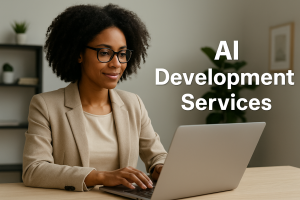Artificial Intelligence (AI) is no longer a futuristic concept—it’s here, and it’s transforming the way companies operate. From automating repetitive tasks to providing predictive analytics and enhancing customer experiences, AI solutions are helping businesses of all sizes gain a competitive edge.
But while the benefits of AI are clear, one of the biggest challenges companies face is choosing the right Artificial Intelligence (AI) service provider. With so many providers offering a range of solutions—from machine learning platforms to AI-powered chatbots—it can be overwhelming to determine who’s the best fit for your organization.
In this guide, we’ll walk you through how to choose the right AI service provider for your company, what factors to consider, and the red flags to avoid.
Why Choosing the Right AI Provider Matters
AI is not a one-size-fits-all solution. Every company has unique goals, data availability, and budget constraints. Partnering with the wrong provider can lead to wasted investments, poor integration, and missed opportunities. On the other hand, the right AI provider can:
- Align solutions with your business objectives
- Help streamline operations and reduce costs
- Ensure compliance with industry regulations
- Provide scalable, future-proof technology
- Offer expert guidance for AI adoption and change management
Key Factors to Consider When Choosing an AI Service Provider
1. Industry Experience and Expertise
Look for a provider with proven experience in your industry. AI needs in healthcare are vastly different from those in retail or finance. A provider with relevant case studies, testimonials, or whitepapers will demonstrate that they understand the challenges and opportunities specific to your field.
Questions to ask:
- Have you worked with companies in our industry before?
- Can you share examples of successful AI implementations?
2. Range of AI Solutions Offered
AI is a broad field. Some providers specialize in narrow solutions (like chatbots), while others offer end-to-end services. Depending on your needs, you may require:
- Machine Learning (ML): Predictive analytics, fraud detection, demand forecasting
- Natural Language Processing (NLP): Chatbots, sentiment analysis, language translation
- Computer Vision: Image recognition, quality control in manufacturing, medical imaging
- Robotic Process Automation (RPA): Automating repetitive back-office tasks
- AI Consulting: Strategy development and roadmap planning
Make sure the provider’s offerings align with your current requirements and potential future needs.
3. Customization vs. Off-the-Shelf Solutions
Some providers offer ready-made AI tools that are quick to deploy but may not fully match your business processes. Others provide custom-built solutions designed around your goals.
- Off-the-shelf solutions are cost-effective and suitable for standard use cases.
- Custom solutions are ideal for businesses with complex requirements or unique workflows.
Choose a provider that can adapt to your company’s level of complexity.
4. Data Management and Security
AI thrives on data. Before choosing a provider, assess how they handle:
- Data integration: Can their system integrate with your existing databases, CRMs, or ERP platforms?
- Data privacy: Do they comply with regulations like GDPR, HIPAA, or CCPA?
- Data security: What encryption, access control, and monitoring systems are in place?
Since AI often deals with sensitive information, security should never be compromised.
5. Scalability and Flexibility
As your company grows, your AI needs will evolve. The right provider should offer scalable solutions that can grow alongside your business.
For example, a small chatbot solution today may evolve into a full AI-driven customer support ecosystem tomorrow. Providers offering modular or cloud-based AI services typically offer the best scalability.
6. Cost and ROI
AI implementation can be expensive, but the cost should be weighed against the potential return on investment (ROI). Instead of focusing solely on upfront expenses, consider long-term value.
Evaluate:
- Pricing model (subscription, pay-per-use, or one-time development fee)
- ROI projections based on efficiency, savings, or increased revenue
- Hidden costs like training, upgrades, and support
7. Technical Support and Training
AI adoption often requires a cultural shift within organizations. Look for providers who not only deliver the technology but also support training, onboarding, and ongoing maintenance.
Key services to look for:
- 24/7 customer support
- Employee training programs
- Documentation and learning resources
8. Reputation and Reviews
Reputation matters. Check online reviews, ratings, and testimonials to gauge a provider’s credibility. Platforms like Gartner, Clutch, and G2 often provide unbiased feedback on AI service providers.
Steps to Choosing the Right AI Provider
Step 1: Define Your Business Goals
Start by identifying what you want AI to achieve—cost reduction, customer experience improvement, revenue growth, or operational efficiency.
Step 2: Assess Your Data Readiness
Ensure your company has clean, structured data to support AI solutions. If not, choose a provider who offers data preparation services.
Step 3: Shortlist Providers
Based on research, narrow down potential providers to a manageable list (3–5 vendors).
Step 4: Request Proposals and Demos
Ask for proposals outlining their solutions, costs, timelines, and success metrics. Live demos or proof-of-concept (POC) projects can help validate capabilities.
Step 5: Compare and Decide
Evaluate each provider based on cost, expertise, scalability, and alignment with your goals. Select the provider who offers the best balance of value and expertise.
Red Flags to Watch Out For
- Overpromising results without proof
- Lack of transparency in pricing
- No experience in your industry
- Poor data security practices
- Limited or no post-deployment support
Future-Proofing Your AI Strategy
AI technology evolves rapidly. To ensure long-term success, partner with a provider that:
- Keeps up with the latest AI trends (like generative AI and edge computing)
- Offers continuous updates and scalability
- Works collaboratively to adapt AI solutions as your business grows
Conclusion
Choosing the right Artificial Intelligence service provider for your company is not just about technology—it’s about finding a partner who understands your goals, industry, and long-term vision. By carefully evaluating providers based on expertise, scalability, security, and support, your company can unlock the true potential of AI and stay ahead in a competitive marketplace.
Strong CTA Ready to explore Artificial Intelligence solutions for your company? Partner with a trusted AI service provider to unlock new opportunities for growth, efficiency, and innovation. Contact Redtgs today for a free consultation!
FAQs
Q1: What types of AI services do companies typically need?
A1: Common AI services include machine learning, natural language processing, computer vision, robotic process automation, and AI consulting.
Q2: How much does it cost to hire an AI service provider?
A2: Costs vary depending on complexity and scope, ranging from a few thousand dollars for basic solutions to millions for enterprise-level projects.
Q3: Can small businesses benefit from AI solutions?
A3: Absolutely. AI can help small businesses automate repetitive tasks, improve customer service, and make better data-driven decisions.
Q4: How long does AI implementation take?
A4: It depends on the project scope. Simple AI solutions can take weeks, while complex enterprise solutions may take months or longer.
Q5: What’s the most important factor in choosing an AI provider?
A5: The provider’s ability to align AI solutions with your specific business goals and provide ongoing support is critical.






